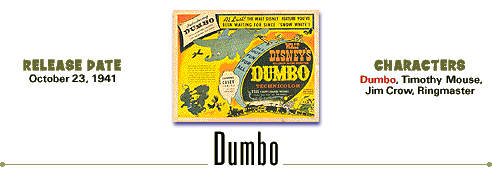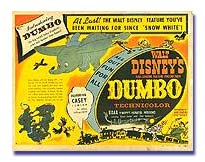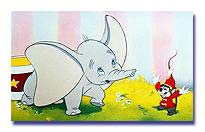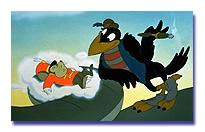 |
 |
 baby circus elephant is born with huge ears and named
Dumbo. He and his mother suffer humiliation from the other
elephants and from children visiting the circus. But humiliation
turns to triumph as Dumbo is surprised to discover through the help
of his faithful mouse friend, Timothy, that he can use his
over-sized ears to fly. baby circus elephant is born with huge ears and named
Dumbo. He and his mother suffer humiliation from the other
elephants and from children visiting the circus. But humiliation
turns to triumph as Dumbo is surprised to discover through the help
of his faithful mouse friend, Timothy, that he can use his
over-sized ears to fly. |
 |

From the time that Walt first read the galleys for the story, he
knew it would make a fine film. Coming after two expensive movies
("Fantasia" and "Pinocchio") the previous year, "Dumbo" was made
for only $812,000, partly because it was able to move very quickly
through the animation department given its succinct story and
clearcut characters. With such a low cost, the film made a welcome
profit for the Studio. "Dumbo" had been scheduled for the cover of
"Time" magazine at the time of its general release in December
1941, but a much more momentous event occurred -- the bombing of
Pearl Harbor -- and poor "Dumbo" was supplanted by Japanese General
Yamamoto. |
 |

Directed by Ben Sharpsteen. From a story by Helen Aberson and
Harold Pearl. Animators: Vladimir "Bill" Tytla, Wolfgang
Reitherman, Fred Moore, John Loundsbery, Hugh Fraser, Milt Neil,
Les Clark, William Shull, Harvey Toombs, Sandy Strother, Don
Towsley, Paul Kossoff, Don Tobin, Claude Smith, Franklin Grundeen,
Berny Wolf, Steve Bosustow, Ed Fourcher, J. Brown, and W. Schoalte.
Starring: the voices of Edward Brophy (Timothy), Sterling Holloway
(stork), and Cliff Edwards (Jim Crow). 64 min. Among the songs are
"Baby Mine," "Pink Elephants on Parade," and "When I See an
Elephant Fly." The film won an Academy Award® for Best Scoring
of a Motion Picture (Frank Churchill and Oliver Wallace), and was
nominated for Best Song ("Baby Mine"). The movie was rereleased in
theaters in 1949, 1959, 1972, and 1976. It was shown on the Disney
television series in 1955; it was released on video in 1981 and
kept in release. |
Learn more about Dumbo
at the Walt Disney Family Museum.
|







